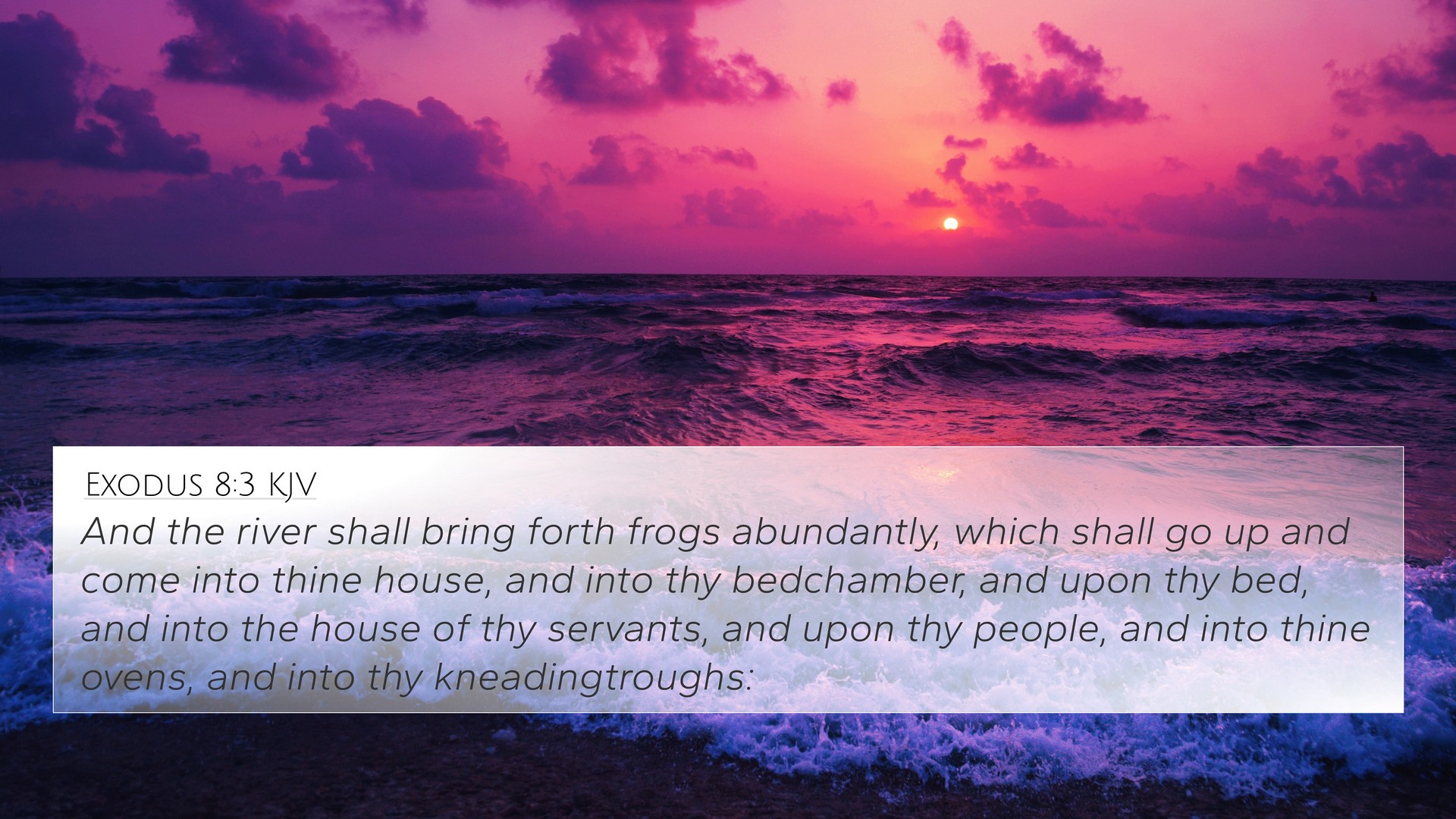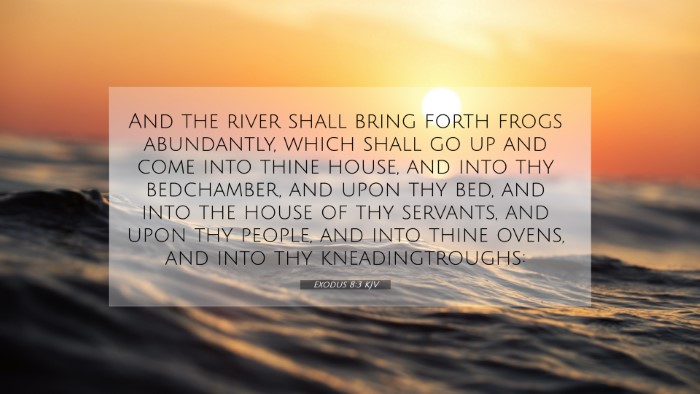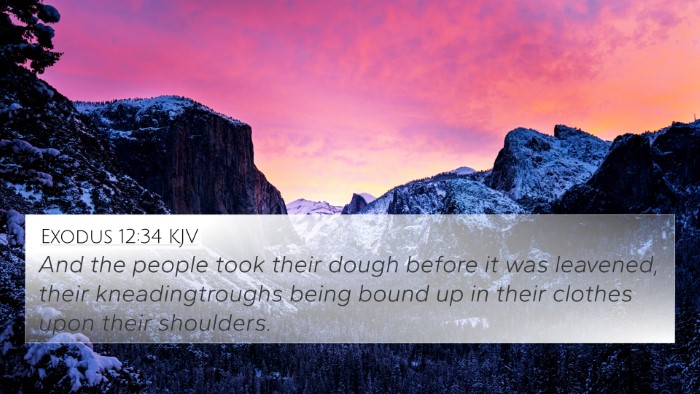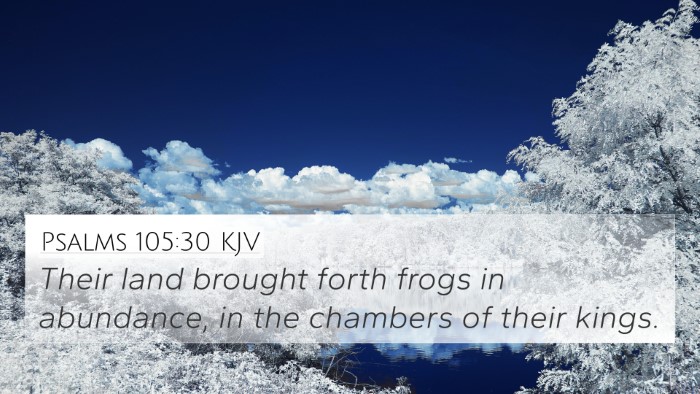Understanding Exodus 8:3
Exodus 8:3 states, "And the river shall bring forth frogs abundantly, which shall go up and come into thine house, and into thy bedchamber, and upon thy bed, and into the house of thy servants, and upon thy people, and into all thy ovens, and into thy kneading troughs."
Summary of Exodus 8:3
This verse is part of the narrative surrounding the second plague of Egypt, where Moses, acting as God's messenger, confronts Pharaoh to demand the release of the Israelites from slavery. The plague brings an overwhelming number of frogs, symbolizing both a tangible punishment and a spiritual message to Pharaoh and the Egyptians.
Contextual Significance
In the context of the book of Exodus, this verse marks a pivotal moment where God demonstrates His power over the gods of Egypt, particularly demonstrating authority over the natural world. Frogs were associated with fertility and rebirth in Egyptian culture, making this plague a direct challenge to their belief system.
Insights from Commentaries
- Matthew Henry: Henry elaborates on the significance of the frogs, noting that their proliferation serves as a divine warning. The abundance of frogs points to the suffocating consequences of ignoring God’s commands. The disruption to daily life emphasizes the seriousness of God's judgments and invites repentance.
- Albert Barnes: Barnes focuses on the supernatural aspect of the plague, emphasizing that God's judgment is both a prevention of comfort and a clear sign of His displeasure towards Pharaoh's heartening obstinacy. The imagery of visiting every part of life demonstrates that there is no escape from God's authority.
- Adam Clarke: Clarke provides an analysis of the symbols within this verse, suggesting that the plague functioned as a direct manifestation of God's power. The intrusion of frogs into personal spaces indicates a personal invasion of divine judgment upon Egypt’s societal comforts, thus leaving the Egyptians no place to hide from God's proclamation.
Thematic Connections
This verse connects to several themes within the Bible, enriching our understanding of God’s judgment and mercy. Themes include:
- God's sovereignty over creation (Job 38:1-41)
- The significance of repentance (2 Chronicles 7:14)
- The struggle against idolatry (Deuteronomy 4:24)
- Divine warning leading to eventual judgment (Isaiah 55:6-7)
Related Bible Cross References
When analyzing Exodus 8:3, it’s important to explore connections between Bible verses to enhance understanding. Notable cross-references include:
- Exodus 7:26: The introduction of Aaron and Moses before Pharaoh.
- Exodus 8:1-2: The announcement of the plague.
- Leviticus 11:10: The classification of frogs within the laws of cleanliness.
- Psalms 105:30: A reminder of God's mighty acts against Egypt.
- Matthew 12:43-45: The New Testament perception of unclean spirits, paralleling themes of infestation.
- Revelation 16:13-14: Demonic spirits resembling frogs that gather kings, signifying spiritual uncleanliness and judgment.
- Genesis 1:20: The creation of living creatures, connecting to God's authority over animal life.
Utilizing Cross-References in Bible Study
Engaging with cross-references reveals a deeper, thematic connection across both the Old and New Testaments:
- Tools for Bible cross-referencing: Utilize a Bible concordance or cross-reference Bible study guide to find connections that highlight thematic unity.
- How to use Bible cross-references: Examine the context surrounding each verse for clarity on how they interrelate.
- Bible reference resources: Look for comprehensive materials that provide an extensive analysis of linking Bible scriptures.
Conclusion
Exodus 8:3 serves as a critical part of the narrative illustrating God’s relentless pursuit of justice and His power over creation. Understanding this verse through the lens of biblical cross-references elevates our grasp of scripture, encouraging both personal reflection and communal learning within the faith.




